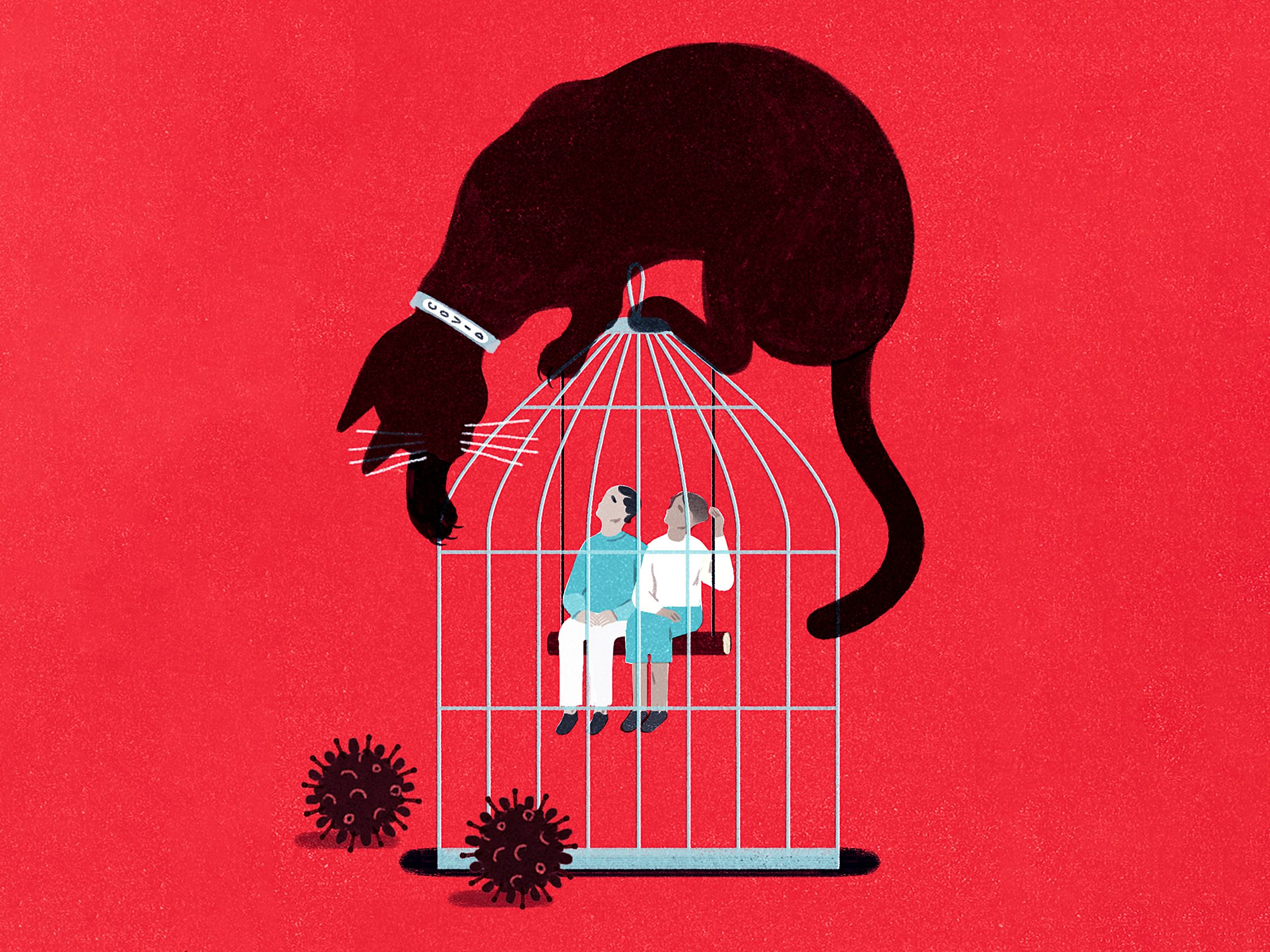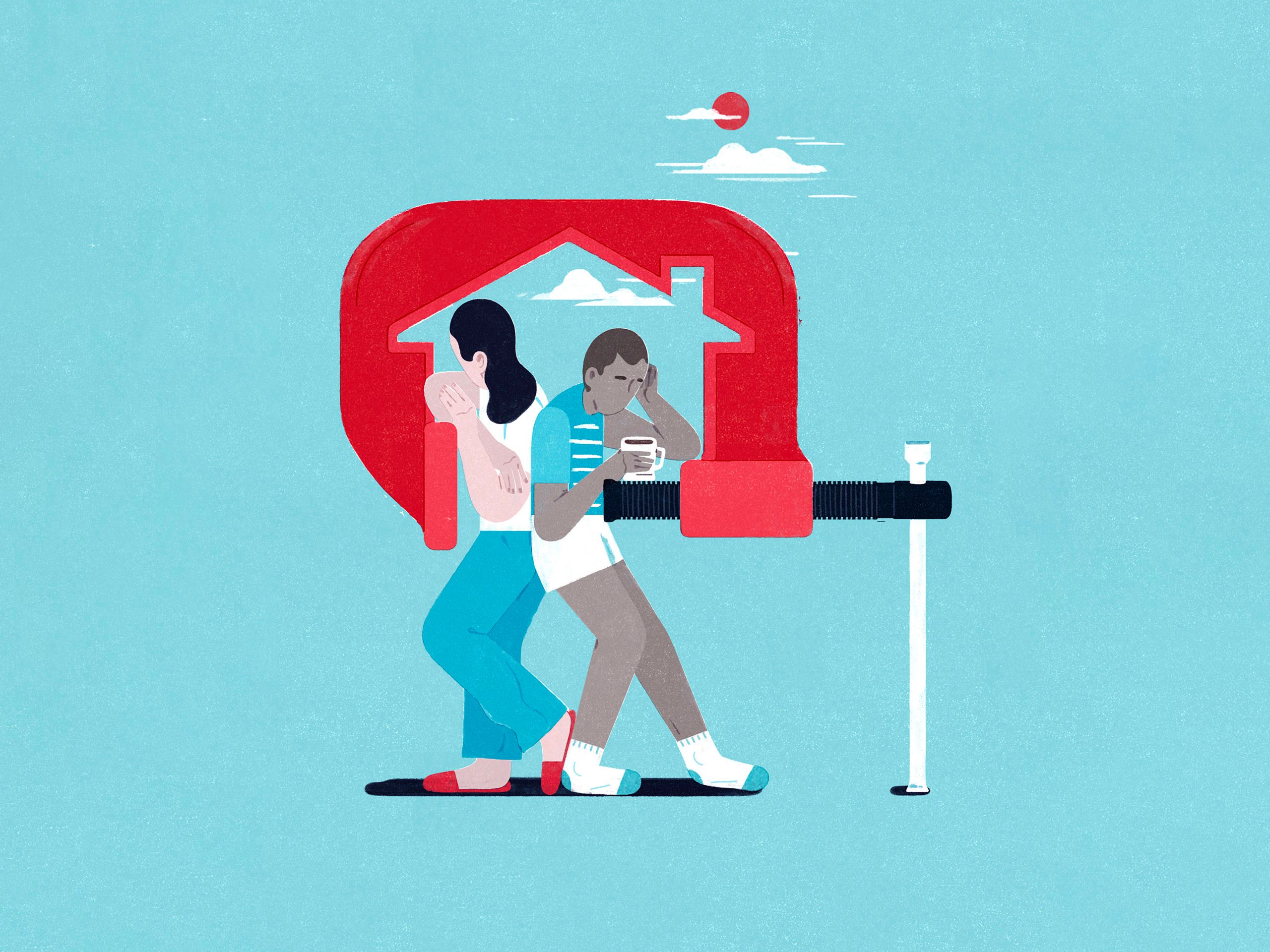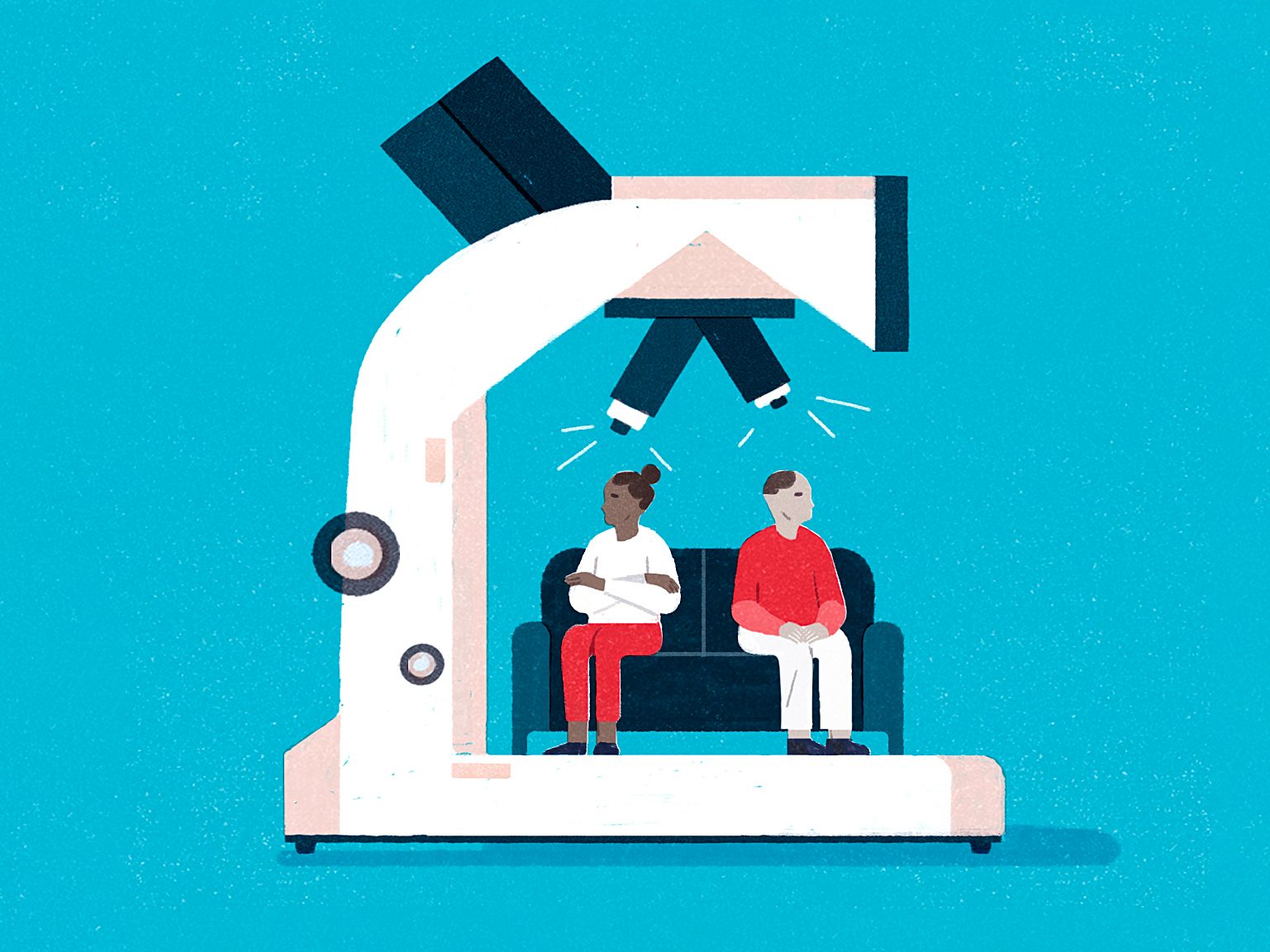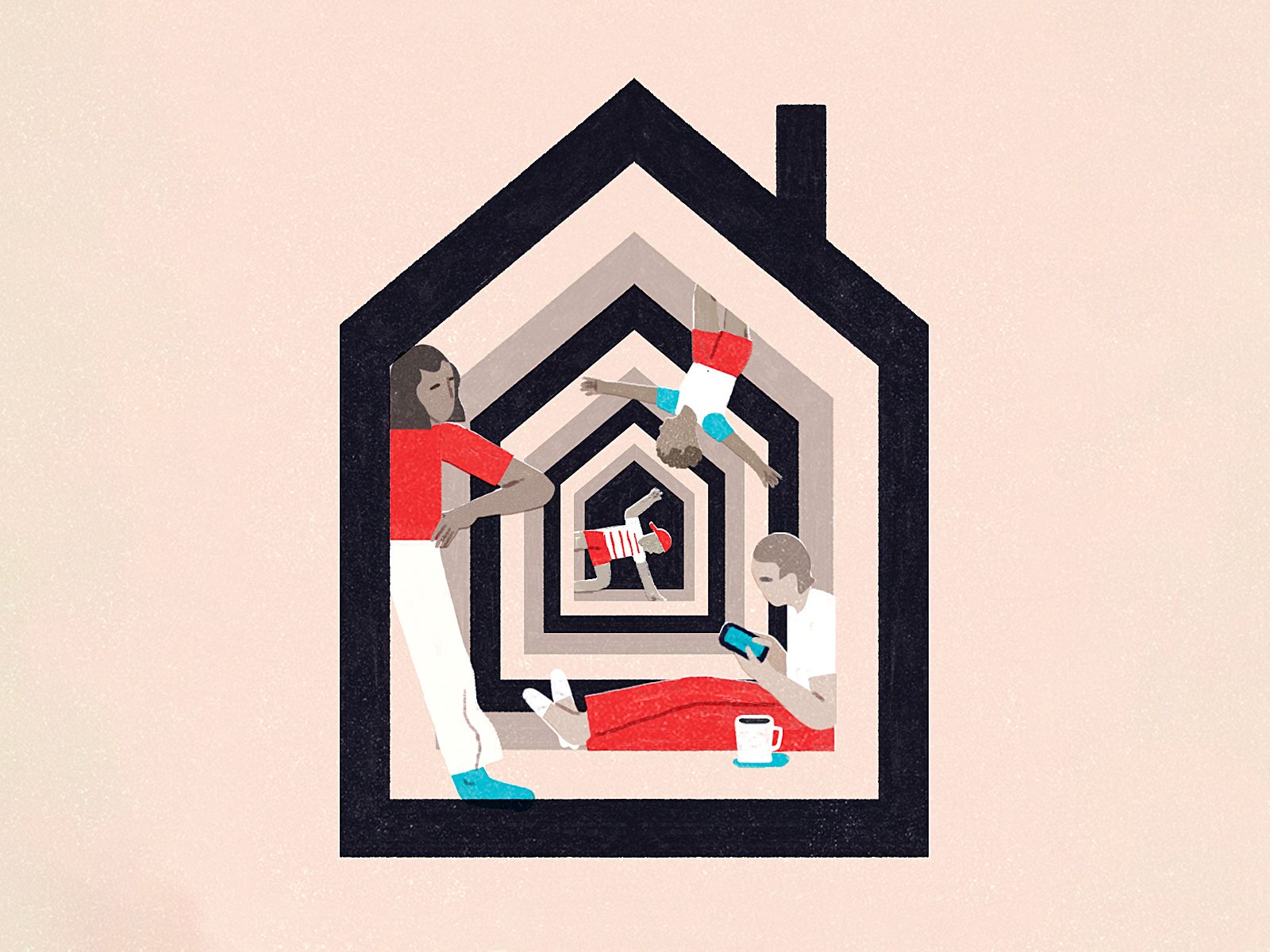Skyrocketing stress, boredom, and yes, the damn chores: Canadian women reveal how dealing with Covid-19 — and all this togetherness — had led to a reckoning in their relationships.
originally published October 2020 in Best Health magazine
*Names have been changed.
My husband is doing it again. The breathing. Was it always this loud? Was it always this…wet?!
I glare at him over my laptop, which is fighting for space with his at our tiny kitchen table.
“Everything okay, honey?” he asks.
“ARGH!” our nine-year-old son shouts, slamming down his iPad, the site of his “distance learning.” “This is stupid! This is wasting my time!”
It’s approximately day 3,298 of the Covid-19 lockdown — or, as some people like to call it, late April 2020. Like millions of people around the world, our family of three has been locked up together in our small house for over six weeks, hiding from a mysterious virus that’s leaving a horrific trail of death and a shattered economy in its wake, all with no discernible end in sight. The novelty of board games and Zoom parties has long worn off, my income as a freelance writer has slowed to a trickle, and guess what? I don’t know how to teach an angry, lonely kid grade three math. I can’t even do grade three math. Tensions, needless to say, are high.
My text alert pings.
“Have you started the research for your end-of-the-apocalypse article about the inevitable increase in divorce rates yet?” my friend asks.
I text back one word.
“YUP.”

It’s September as I’m writing this, and Toronto, where I live, has been in “Stage 3” for a few weeks — a somewhat normal level of day-to-day activity, with a lot more face masks. My marriage emerged from stages 1 and 2 largely unscathed, petty irritations like breathing moistly long forgotten. But there was definitely a rise in aggravated sniping and frustration-induced dishwasher slamming, and I know we’re not the only ones. Canadian family lawyers are reporting a larger-than-usual influx of new clients; it’s possible we’ll see the same pattern as Wuhan, China, where divorce rates skyrocketed post-lockdown. And instead of the baby boom everyone joked about when isolation began, Brookings research group predicts a lingering pandemic-induced baby bust in the U.S., and possibly in Canada as well — either because nobody is having sex anymore or because women are putting off, or completely avoiding, having children because of the shaky economy.
For many cohabitating couples, especially ones with kids, lockdown was like a bucket filled with gasoline that was set on fire by a laser, exposing not only the fault lines in those individual relationships but the vulnerabilities of modern relationships as a whole.
“It’s like five years of regular marriage crammed into four months of pandemic marriage,” says Ada Calhoun, the author of Why We Can’t Sleep, a book about the frustrations of Gen X women. “It’s like dog years.”
“You can be married to almost anybody if you only see them for a couple of hours a day,” says Andrew Sofin, a couples counsellor and the president of the Canadian Association of Marriage and Family Therapy. “But now people are forced to be together.”
So while none of us could have predicted that the resiliency of our romantic partnerships would be judged by how they weather a seismic global meltdown the likes of which we haven’t seen in generations, here we are. Even if a vaccine is magically developed tomorrow, the fissures that have appeared in couples’ lives will haunt them long after the first wave of “Thanks for social distancing!” signs are taken down. Excluding the far more complicated rise in domestic assault since the pandemic began, and the nightmarish scenario that faced couples who were already separating and suddenly had to isolate together, most cohabitating spouses in the world have now lived through some version of a Covid-19 lockdown crisis and will be navigating a radically different world that could include more working from home, a smaller social circle, fewer recreational outlets, more home-schooling and a struggling economy for the foreseeable future.
“If we want to look at the challenges of communication, of sexuality, of desire, of conflict in relationships, this is such a petri dish moment,” Esther Perel, the famous psychotherapist, podcast host and author of Mating in Captivity, told the New Yorker in the spring. “When people live in acute stress, either the cracks in their relationship will be amplified or the light that shines through the cracks will be amplified.”
So where are the biggest cracks? And how can we find the light?

One big, oozing, festering divide to emerge from Covid-19 so far is a super-concentrated deadly virus version of an equality problem women have been pointing out for years: The. F*cking. Chores.
For women, especially ones in heterosexual relationships with kids, the breathtaking speed at which more, most or all of the pandemic household duties and child minding, schooling and soothing fell onto their plates was shocking. Some pundits are even calling the Covid-19 recession a “she-cession” due to the number of mothers who either left jobs or cut back on what work they did have to care for children when schools and daycares were shuttered.
Generally speaking, men still make more money than women, so if someone has to quit their job, reduce their hours or just put in a half-assed effort to play schoolteacher instead, guess who it’s probably going to be? Because while today’s dads do more domestic work and child care than their fathers did, studies have shown women still do up to 70 percent more unpaid labour even when both partners have full-time jobs and even if the woman makes more money. Many dads would vigorously dispute this figure — they think they do as much or more than their female partners. (A May survey in the New York Times found that 45 percent of dads thought they were doing most of the Covid-19 home-schooling, but only three percent of their female partners agreed.)
While it’s hard to say who’s right (is it, though?), years of research using time diaries consistently show that men overestimate the time they spend on household duties and child care, never mind all that invisible “emotional labour” — the mental load of keeping a home humming, the larder stocked, the birthday parties planned, the hockey sign-up day remembered and the pandemic face masks purchased. Covid-19 turned this already grating divide into a white-hot slash of female rage.
“When I interviewed women for my book, they were all barely hanging on, and this was two years ago,” says Calhoun. “They felt like there was already too much, and suddenly there’s a pandemic and their kids are home with them to be home-schooled — it’s just one thing after another. It’s almost comical.”
When Covid-19 hit, 48-year-old Natalie’s * administrator career kept humming along, but her husband’s work shuttered. For the first time in their nine-year relationship, he drove the family bus while she was the sole breadwinner. But all that did was make it painfully clear just how much — too much! — she’d been silently doing for years.
“I cannot tell you how easy it was to just work,” she says. “My life was magical. I didn’t do a dish, I didn’t know how much toilet paper was in the house, I didn’t know if the dog needed more medication, I didn’t research a camp, I didn’t grocery shop.… I don’t know how I did it all before.” But a few weeks ago, her partner went back to work. “And guess what’s happening? It’s all sliding back onto my plate, and I’ve become enraged. Now I’m so overwhelmed, I’m sobbing every night.”

Simone,* 48, was also sobbing every night during lockdown. She told her partner of 25 years she was upset because she’d been furloughed. The truth was, when the world stopped, she finally had time to think about what she really wanted in her marriage.
“Suddenly, when your life is totally put on hold, it’s there in front of you and you kind of have to face it,” she says. “For so long I would just hope our problems would blow over. Things would hit a boiling point, and we’d fight. I’d tell him, ‘Stop being selfish, stop being so needy, stop talking to me about how you’re lonely. We have kids to raise!’ I’d cry, we’d have sex and then we could pretend everything was okay. I was fine with that, but being in lockdown turned me into this exposed nerve, and now I’m at a totally different place, where I’m like, no, it’s not fine — we can’t just keep going through this cycle.”
Calhoun isn’t surprised by this pandemic-induced moment of relationship reckoning. “Everybody was working so hard and doing so much that you could float by for years without even really having a conversation with the person you’re with. If there are problems, you don’t necessarily address them because you’re too busy and you don’t really spend quality time together that would give you that space.”
“Now that people have had more time with each other, it’s prompted them to go, ‘Okay, what are we doing? How are our kids? Where are we at?’” says Sofin.
In Simone’s house, the lack of outward distraction during the pandemic finally forced an honest conversation between her and her husband about whether they should stay together. Their answer, for the moment, is still TBD, but Simone thinks Covid-19 kick-started a decision-making process that was long overdue.
***
Of course, there’s definitely such a thing as having too much time together. The biggest joke about post-lockdown divorce, especially for couples now working from home, is always some version of the universal death by a million cuts — the sheer cabin-fever-induced aggravation of being stuck with the same person, and no one else, for months. Irritating habits become nuclear-level-worthy subjects of discussion — fart again, I DARE YOU — and, especially if you live in tight quarters, you never have a hot minute to yourself. Even the happiest of couples get on each other’s nerves sometimes, and if you never have a break? Let’s just say if absence makes the heart grow fonder, forced constant togetherness makes the heart want to throw that stupid Fortnite controller and the man who has been holding it for eight straight hours off a bridge (just a random example!).
The only solution is learning to ignore each other. But what happens when couples learn to ignore each other a little too well? What if they never stop?
“There’s a healthy way of ignoring each other — I’m in my work zone and you’re in your work zone, and then we’ll come back,” says Sofin. “But it can also be unhealthy if you don’t learn to leave the work. This is why it’s important to do something together to separate work time from leisure time, like going for a walk. If you don’t, the other person will feel completely ignored.”
That’s not a feeling lonely spouses are likely to forget, and as working from home becomes the norm for many, it’s a relationship hazard that may never go away.
“We’ve definitely learned to ignore each other to get our work done,” says 43-year-old Claire.* “Sometimes I’m not sure if he’s even in the house. At the end of the day, we’re so tired and Zoomed out, we need space to ourselves. So we continue to ignore each other. I know it’s leading to a bad place, and I have no idea what to do about it.”

Spending too much time together isn’t the only problem the various phases of Covid-19 lockdown wrought on romance. It’s also the lack of spending time — or enough time — with anybody else.
One of the main points in Perel’s bestseller Mating in Captivity is that in modern society, people expect their romantic partner to fulfill all of the social and emotional needs that historically were provided by an entire community, a litmus test almost every spouse is destined to fail. If this is what you believe, even subconsciously, and your whole world disappears in an instant — Goodbye, co-workers! See you in 2021, friends! Maybe never, immune-compromised aging parents! — that pressure on your romantic relationship becomes even more unrealistic and the disappointment when your partner inevitably fails that much more corrosive.
Never mind that it’s hard to feel interesting or interested when life has, for the most part, become so boring. There’s not a lot to talk about when you’ve been seeing no one and going nowhere. As Holly, 49, put it, you can’t even ask “How was work?” because, well, you already watched that movie all day. (Spoiler alert: He had a conference call. Also, ate some tuna.)
As for sex, well…the electrifying combo of boredom and the looming spectre of a possible untimely death mixed with grief about the end of the world as we know it isn’t exactly an aphrodisiac. When Holly is asked if the stress of Covid-19 has put a damper on her sex life, she laughs.
“A damper? Try ‘wrapped it in duct tape and buried it in the garden.’ We don’t have date nights anymore. We don’t even sit in the backyard with a glass of wine. I need some romance, and the situation isn’t conducive to that.”
***
Stress makes couples fight, and one of the biggest life stressors is financial insecurity. Thanks to the bludgeoned economy, life is starting to feel like one long financial stress test for more and more households, with millions of Canadians losing their jobs, collecting CERB, putting holds on their mortgages or closing their small businesses — and those are the lucky ones who aren’t scrambling to afford the very basics. As Sofin points out, a couple’s income prior to the pandemic and the type of work they do will be an indicator of how well they’re positioned to get through it.
“Some couples have done really well, even better than pre-pandemic, in some cases. But if you both work in retail, where you’re being exposed every day, and you’re living in a small place like an apartment, your level of stress and anxiety is going through the roof,” he says. “There’s going to be a huge socio-economic divide about how Covid-19 impacts couples and families.”
While my husband and I definitely saw a dip in our household income, thanks to my gig-based occupation (and a subsequent sweat-inducing dive into ye olde line of credit), my marriage’s ability to weather the storm — so far, anyway — is in no doubt buoyed by a hearty baseline of privilege. We live in a house where we could each carve out our own small “office” space, my husband doesn’t seem to be in danger of losing his job, and we both have white-collar professions we can do while hiding at home. Things I thought of as little luxuries before, like having a small backyard — oh precious, precious backyard — where even during the strictest phases we’re able to get some fresh air, suddenly become game-changers.
So, deep fractures of festering resentment, boredom and anxiety? Covered! But what about that magical light that’s supposed to shine through the cracks in your Covid-tested bond?
In some ways, this sudden worldwide experiment might be a harbinger of positive change, at least when it comes to what we expect or need from our relationships. I spoke with several women, for example, who said the sheer amount of pandemic bickering finally convinced their partners to go to couples therapy or even just actually talk about their relationship at all. Others reported happy shifts on that excruciatingly boring but endlessly draining issue of the chores. Everyone’s partnerships shifted somehow, because really, it would be almost impossible for them not to. “The world is different, so my relationship is different,” says Theresa, 40. “Covid-19 is going to affect us permanently.”
“Many women I talked to for my book told me they wanted to blow it all up,” says Calhoun. “They were so frustrated and so exhausted. The pandemic kind of did that — it did blow it all up. A lot of jobs got lost, a lot of marriages were upturned, the kids’ schedules went out the window, and everything just went back to zero. A lot of women I’ve heard from since Covid-19 are saying, ‘We want to build back our lives and our relationships in a more satisfying way,’ and maybe there’s an opportunity for that now.”
